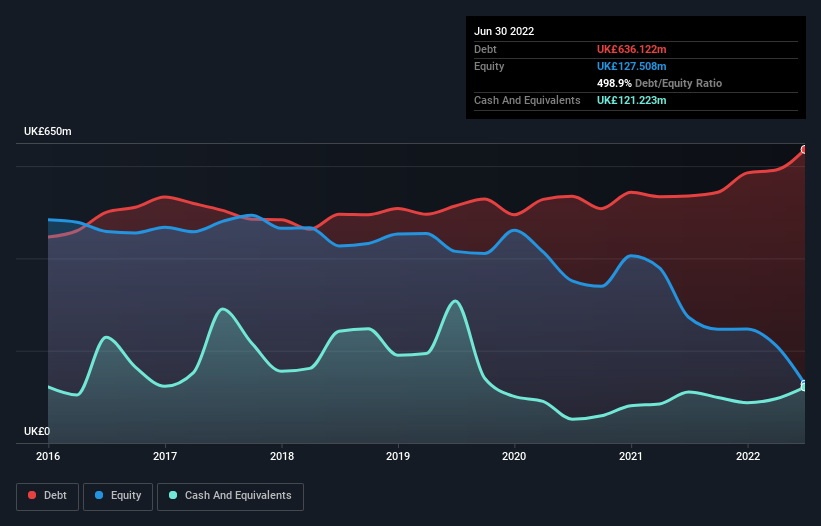
Warren Buffett famously said, 'Volatility is far from synonymous with risk.' So it seems the smart money knows that debt - which is usually involved in bankruptcies - is a very important factor, when you assess how risky a company is. Importantly, Manchester United plc (NYSE:MANU) does carry debt. But the real question is whether this debt is making the company risky.
Why Does Debt Bring Risk?
Generally speaking, debt only becomes a real problem when a company can't easily pay it off, either by raising capital or with its own cash flow. If things get really bad, the lenders can take control of the business. However, a more usual (but still expensive) situation is where a company must dilute shareholders at a cheap share price simply to get debt under control. Of course, plenty of companies use debt to fund growth, without any negative consequences. When we examine debt levels, we first consider both cash and debt levels, together.
Our analysis indicates that MANU is potentially overvalued!
How Much Debt Does Manchester United Carry?
The image below, which you can click on for greater detail, shows that at June 2022 Manchester United had debt of UK£636.1m, up from UK£535.4m in one year. However, it also had UK£121.2m in cash, and so its net debt is UK£514.9m.

How Strong Is Manchester United's Balance Sheet?
We can see from the most recent balance sheet that Manchester United had liabilities of UK£494.8m falling due within a year, and liabilities of UK£671.3m due beyond that. Offsetting this, it had UK£121.2m in cash and UK£91.6m in receivables that were due within 12 months. So it has liabilities totalling UK£953.3m more than its cash and near-term receivables, combined.
While this might seem like a lot, it is not so bad since Manchester United has a market capitalization of UK£1.83b, and so it could probably strengthen its balance sheet by raising capital if it needed to. However, it is still worthwhile taking a close look at its ability to pay off debt. When analysing debt levels, the balance sheet is the obvious place to start. But ultimately the future profitability of the business will decide if Manchester United can strengthen its balance sheet over time. So if you want to see what the professionals think, you might find this free report on analyst profit forecasts to be interesting.
In the last year Manchester United wasn't profitable at an EBIT level, but managed to grow its revenue by 18%, to UK£583m. That rate of growth is a bit slow for our taste, but it takes all types to make a world.
Caveat Emptor
Importantly, Manchester United had an earnings before interest and tax (EBIT) loss over the last year. To be specific the EBIT loss came in at UK£85m. When we look at that and recall the liabilities on its balance sheet, relative to cash, it seems unwise to us for the company to have any debt. Quite frankly we think the balance sheet is far from match-fit, although it could be improved with time. We would feel better if it turned its trailing twelve month loss of UK£116m into a profit. So to be blunt we do think it is risky. When analysing debt levels, the balance sheet is the obvious place to start. However, not all investment risk resides within the balance sheet - far from it. We've identified 1 warning sign with Manchester United , and understanding them should be part of your investment process.
If you're interested in investing in businesses that can grow profits without the burden of debt, then check out this free list of growing businesses that have net cash on the balance sheet.
New: Manage All Your Stock Portfolios in One Place
We've created the ultimate portfolio companion for stock investors, and it's free.
• Connect an unlimited number of Portfolios and see your total in one currency
• Be alerted to new Warning Signs or Risks via email or mobile
• Track the Fair Value of your stocks
Have feedback on this article? Concerned about the content? Get in touch with us directly. Alternatively, email editorial-team (at) simplywallst.com.
This article by Simply Wall St is general in nature. We provide commentary based on historical data and analyst forecasts only using an unbiased methodology and our articles are not intended to be financial advice. It does not constitute a recommendation to buy or sell any stock, and does not take account of your objectives, or your financial situation. We aim to bring you long-term focused analysis driven by fundamental data. Note that our analysis may not factor in the latest price-sensitive company announcements or qualitative material. Simply Wall St has no position in any stocks mentioned.
About NYSE:MANU
Manchester United
Operates a professional sports team in the United Kingdom.
Very low with weak fundamentals.
Market Insights
Community Narratives



